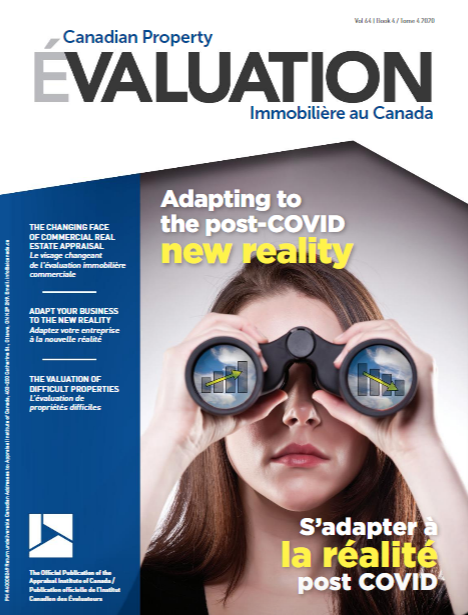Rent review: Span West case comment
Canadian Property Valuation Magazine
Search the Library Online
Rent review: Span West case comment
By John Shevchuk, Barrister & Solicitor, C.Arb, AACI(Hon), RI
In previous articles in this publication, I wrote about rent review based on market rents and when there will be a deviation from that standard.[i] In this article, the question is revisited in the context of the Saskatchewan Court of Queen’s Bench decision in Bank of Nova Scotia v. Span West Farms Ltd. [Span West].[ii] Although not receiving much judicial comment subsequent to its publication, Span West provides an interesting perspective of market rents for rent review purposes and it addresses the right to appeal a rent review award.
Span West arose out of an appeal of a rent review arbitration decision interpreting and applying the following clause:
25.04 Arbitration
The amount of the rent, based upon current market rentals prevailing at the commencement of the applicable renewal term for comparable locations and premises, not including leasehold improvements effected by or on behalf of the Bank, to be paid by the Tenant to the Landlord during the renewal term of this lease as provided for herein shall be agreed to by the parties, and if the parties cannot agree, the rent shall be settled by the award of three arbitrators or majority of them, one to be named by the Landlord, and one by the Tenant, and the two thus chosen to select a third, at least ninety (90) days before the expiration of the Term and any renewal thereof, and the award made by majority of them shall be made before the expiration of this Term and any renewal hereof, and shall be binding upon the parties hereto. The expenses of the arbitration shall be borne equally by the parties. The arbitration shall be conducted in accordance with the Arbitration Act of the Province of Saskatchewan.
The arbitration award
In their decision, a majority of the board of arbitrators noted the parties’ agreement that rent based on “current market rentals prevailing at the commencement of the applicable renewal term” called for an objective determination rent, i.e., without reliance upon subjective circumstances peculiar to the landlord or the tenant. It was further agreed that the rent was to be set based on comparable locations and premises.
However, the majority of the board said the challenge was determining what were “comparable locations and premises.” They wrote that the best possible comparable would be an identical building located immediately across the street from the subject premises, but no such premises existed. Not surprisingly, the arbitrators concluded that they had to consider premises in other locations and then adjust the rents for those premises up or down for application to the subject premises. A majority of the arbitrators concluded that the best comparables were in the local downtown business district on the main street.
The parties presented a pool of comparables with rents ranging from $12.00 to $21.00, the most expensive being premises occupied by the Royal Bank of Canada. The arbitrators held that the bank premises were the best comparable of the lot, but not perfect – in short it had features that made it a better location relative to the subject. They also concluded that the best comparable did not create “current market rentals for comparable locations and premises.” The remaining four premises had rents significantly lower than the Royal Bank of Canada premises. The arbitrators settled on $18.00 as the rent for the renewal period, stating that the Royal Bank of Canada premises “over balances the much lower rates paid for the other properties.”
The tenant appealed the arbitration award.
The issues on appeal to the court
Two of the issues addressed by the court in the tenant’s appeal were as follows:
- Was a right of appeal excluded by the terms of the lease?
- Did the arbitrators correctly interpret “current market rentals for comparable locations and premises?”
Was a right of appeal excluded?
The arbitration clause in Span West provided in part as follows:
25.04 Arbitration
The amount of the rent … to be paid by the Tenant to the Landlord during the renewal term of this lease … shall be agreed to by the parties, and if the parties cannot agree, the rent shall be settled by the award of three arbitrators or majority of them … and the award … shall be binding upon the parties …
The landlord argued that “settled” and “binding” had the effect of removing the right of appeal of the arbitrator’s decision. Previous court cases referred to by the court held that insertion of the phrase “final and binding” could have the effect of precluding an appeal of an arbitral award in a rent review. The court stated the issue as whether “settled” and “binding” had the same effect as “final and binding.”
At paragraph 17, the court held that “settled” is equivocal; it may be read as meaning “to ascertain, to establish or to fix,” but it does not abrogate a right of appeal under arbitration legislation. However, the court wrote the following at paragraph 18:
18 The remaining issue is whether the absence of a right to appeal an arbitrator’s award in s. 25.04 should be read as an implicit waiver of the right of appeal available under s. 45 of the Act, or a mere indication that the parties never directed their minds to the issue. Following the reasoning applied by Finlayson J.A. in L.I.U.N.A., supra, I am satisfied that the absence of a right of appeal provision in the Lease, a lengthy document covering all aspects of the tenancy arrangement in detail, confirms the parties did not intend awards made under s. 25.04 to be subject to appellate review. In other words, when read in conjunction with the old and new Acts [of Saskatchewan], s. 25.04 implicitly eliminates the right of appeal under the Act.
The court could have stopped there, but it went on to address the interpretation of “current market rentals for comparable locations and premises.”
“Current market rentals for comparable locations and premises”
The court concluded that “current market rentals for comparable locations and premises” has a different meaning than “market rents.” The explanation is found at paragraphs 27 and 28 of Span West:
27 ”Market rent” has a prospective element to the extent it considers the rental rate a premises would attract if offered to the market at large on the day the tenant exercised its renewal right. It also takes into account rents payable under existing leases of similar premises. In contrast, the approach employed in s. 25.04 only considers current rents payable for comparable locations and premises and fixes the rent for the renewal term with reference thereto. The results achieved by these two approaches may be substantially different, as illustrated by the following example:
Assume the existing rental rate for the leased premises is $5.00 per square foot on the date a lease comes up for renewal and the existing rental rate for comparable locations and premises then is $6.00 per square foot. If a very active real estate market exists on the renewal date, or equivalent rental space is in short supply, the subject leased premises would command a rental rate much higher than $6.00 per square foot. Conversely, if the real estate market is materially depressed on the renewal date the market rent for the premise may be much less than $5.00 per square foot.
The approach prescribed by the Lease would produce a renewal rental rate in the neighbourhood of $6.00 per square foot in either scenario.
28 The self-evident purpose of the criteria employed by the Lease is to cushion the parties from the vagaries of rapidly fluctuating real estate markets. I am satisfied that the board understood and properly interpreted the subject provision and therefore dismissed the landlord’s appeal to the extent it is based on the second issue.
Closing
The conclusion of the court in Span West that the right of appeal had been abrogated by the terms of the lease has had a subsequent mixed reaction with at least one court refusing to adopt the reasoning of the Saskatchewan Queen’s Bench.[iii]
There appears to have been no judicial consideration of the conclusion in West Span regarding the prospective nature of “market rent” and the implications of “current” and “prevailing” as the basis for determining rent for a renewal period. It is impossible to say the extent to which the case has influenced arbitration awards in rent review proceedings. However, the case does offer the possibility that an arbitration panel could agree that use of words like “current” and “prevailing” convey an intention to set rents based on what is existing at the time of the review rather than what would be negotiated as at the renewal date.
End notes
[1] Rent Review: Does the Existing Lease Matter? (Canadian Property Valuation, 2018 – Volume 62 – Book 3); Rent Review Clauses: Market-Based or Not? (Canadian Property Valuation, 2017 – Volume 61 – Book 4)
ii 2003 SKQB 306,
iii Fern Trust (Trustee of) v. Trevail Mining (New Brunswick) Ltd., 2019 ONSC 4225 (Ont. S.C.J.) at para. 19-21
This article is provided for the purposes of generating discussion and to make practitioners aware of certain challenges presented in the law. It is not to be taken as legal advice. Any questions relating to the matters discussed herein should be put to qualified legal and appraisal practitioners.





